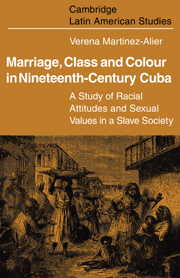Marriage, Class and Colour in Nineteenth-Century CubaPosted in Anthropology, Books, Caribbean/Latin America, History, Law, Media Archive, Monographs, Slavery, Social Science, Women on 2011-07-16 04:11Z by Steven |
Marriage, Class and Colour in Nineteenth-Century Cuba
Cambridge University Press (available in the United States at University of Michigan Press here.)
August 1974
224 pages
216 x 140 mm
Paperback ISBN: 9780521098465
Verena Martinez-Alier (a.k.a. Verena Stolcke), Professor Emeritus of Social Anthropology
Universitat Autónoma de Barcelona
An analysis of marriage patterns in nineteenth-century Cuba, a society with a large black population the majority of which was held in slavery but which also included considerable numbers of freedmen. Dr Martinez-Alier uses as her main source of evidence the records in Havana of administrative and judicial proceedings of cases in which parents opposed a marriage, of cases involving elopement, and of cases of interracial marriage. Dr Martinez-Alier develops a model of the relation between sexual values and social inequality. She considers the importance of the value of virginity in supporting the hierarchy of Cuban society, based on ascription rather than achievement. As a consequence of the high evaluation of virginity, elopement was often a successful means of overcoming parental dissent to an unequal marriage. However, in cases of interracial elopement, the seduced coloured woman had little chance of redress through marriage. In this battle of the sexes and the races, the free coloured women and men played roles and acquired values which explain why matrifocality became characteristic of black free families.
Table of Contents
- Introduction
- Part I. Interracial Marriage:
- 1. Intermarriage and family honour
- 2. Intermarriage and politics
- 3. Intermarriage and Catholic doctrine
- 4. The white man’s view
- 5. Colour as a symbol of social status
- 6. Intraracial marriage
- Part II. Honour and Class:
- 7. Elopement and seduction
- 8. Conclusion: Some analytical comparisons.
Read the introduction here.
…Nineteenth-century Cuba cannot be treated as a historical and geographical isolate. Political factors outside Cuba were significant in shaping interracial marriage policy. The cultural tradition of Spain which during three centuries had espoused ‘purity of blood’ as the essential requisite of Spanishness must also be taken into consideration. Racism antedates slavery in the Americas and, as W. Jordan has proposed, the question would be to explain why African negroes (and not for instance the American Indians) were enslaved in the first place. To establish, therefore, a direct causal link between slavery as a highly exploitative system of production and racism would be too simple…
